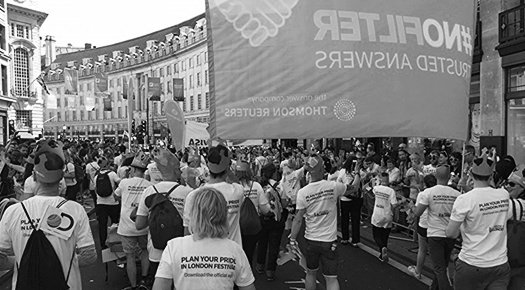
Photo Credits: Thomson Reuters
Of the nearly 3,000 people polled, two-thirds (66 per cent) said same-sex relationships were “not wrong at all,” down from 68 per cent the previous year – marking the first drop since 1987, when the figure stood at 11 per cent.
In 1987, when every household received sombre leaflets warning “don’t die of ignorance,” nine out of 10 people thought there was something wrong with sexual relations between two adults of the same sex. After that, every year tolerance had increased until now. The British Social Attitudes Survey has found the number of people believing there is nothing wrong with gay sex has fallen, leaving a third of the population in some way opposed.
“Liberalization of attitudes does seem to be slowing down,” said the independent social research agency NatCen, which carried out the research. “While social norms have changed, there is a significant minority of the population who remain uncomfortable with same-sex relationships and as such we may have reached a point of plateau.”

“Over the last three years attitudes seem to have been stabilizing,” Nilufer Rahim, the organization’s research director, told the Thomson Reuters Foundation. “What we might be seeing is that attitudes are plateauing now - we might be reaching a point at which attitudes might not liberalize in the same way as they have done since the early 1980s.”
It would certainly require future polling to confirm whether the small rise in people who consider gay sex to be wrong in some way was statistically significant. On the other hand, researchers predicted that the minority of opponents to same-sex relations, including religious groups, would become increasingly determined to make their socially conservative views heard in public discussions on gender and relationships.
As the Guardian reports, religious and politically conservative groups have been increasingly vocal in their resistance to social liberalism. This week, parents at Parkfield community school in Saltley, Birmingham, restarted protests over the teaching of lesbian, gay, bisexual and transgender issues in schools, arguing the lessons are inconsistent with their understanding of Islam.
Ciarán Kelly, the deputy director of the non-denominational Christian Institute, said there has been “increasing pressure on people who are happy to tolerate sexual relations between adults of the same sex to endorse or celebrate it”.
“We saw that with the case of the bakery in Northern Ireland where the bakers were under pressure not just to be tolerant of homosexuality, but to endorse it by supplying a cake with a slogan supporting same-sex marriage,” he said. “The bakers won their case at the supreme court.”
Those people who think that tolerance should be imposed aren’t tolerant at all, and they precisely make up this third of respondents who are against acceptance of same-sex relationships.
